Education & Training
Institutional Career Development and Training
Frontiers plays a critical role in educating and training researchers through comprehensive education and training programming in a wide variety of settings and for the full spectrum of learners. While the primary focus of this core is providing education on how to conduct and advance translational research, additional training in entrepreneurship, implementation and dissemination research, engaging with participants and communities, informatics, and participant recruitment is also available to trainees, scholars, faculty and collaborators.
To learn more about Training opportunities, please reach out to Holly Zink, Ph.D., MSA.
For additional information on the Mock Study Section, please reach out to Heather Fielding-Gebhardt, Ph.D.
For high school and undergraduate students, please visit our Pathway Programs page for links to local programs.
Early Career Faculty Career Development (KL2 Scholars Program)
The Frontiers Clinical and Translational Science Institute (CTSI) KL2 Program is a rigorous training opportunity designed to cultivate a skilled cadre of early-career translational researchers. Supported by the National Institutes of Health (NIH) Clinical and Translational Science Award, the KL2 Program provides scholars with the knowledge, skills, and resources necessary to drive innovative and impactful clinical and translational research. Through a combination of mentorship, education, and hands-on research experience, the program aims to foster a culture of excellence, collaboration, and innovation among its scholars, ultimately leading to improvements in health outcomes for individuals and communities.
The KL2 has three main components:
- Developing productive and beneficial mentoring relationships
- Completing a core curriculum focused on advancing in a career as an independent translational investigator
- Successfully conducting a translational research project
At the heart of the KL2 Program is a strong emphasis on mentorship. Scholars work with experienced mentors who provide guidance and support in scientific research, career development, and work-life integration. With access to a range of mentors and resources, scholars have the opportunity to develop into independent researchers capable of addressing complex health challenges. The program also offers a tailored core curriculum that includes training in clinical and translational research, as well as career development activities. By providing scholars with the necessary skills, knowledge, and support, the Frontiers CTSI KL2 Program aims to nurture the next generation of leaders in translational science.
Questions regarding the program can be sent to the KL2 & TL1 Program Director, Holly Zink, Ph.D., MSA.
Program Benefits
The KL2 Program offers a range of benefits designed to support scholars in their development as independent clinical and translational researchers. These benefits include:
Salary support for up to 75% protected time* (9.0 Calendar Months) dedicated to research, allowing scholars to focus on their research efforts. Salary support will be provided up to $120,000.
Provided $25,000 in research funds per year*, which can be used for project supplies, publication costs, and travel to conferences or workshops. The average total amount budgeted per scholar must not exceed $180,000 in direct costs per year.
Up to two years of training in a collaborative, supportive environment, providing scholars with the opportunity to engage with peers and mentors.
Intensive mentored research experience, ensuring scholars receive guidance and support from experienced researchers throughout their projects.
Formal training in clinical and translational research, including coursework and seminars to enhance scholars' research skills and knowledge.
Assistance toward securing independent funding by the end of Year 2, helping scholars transition to the next stage of their research careers.

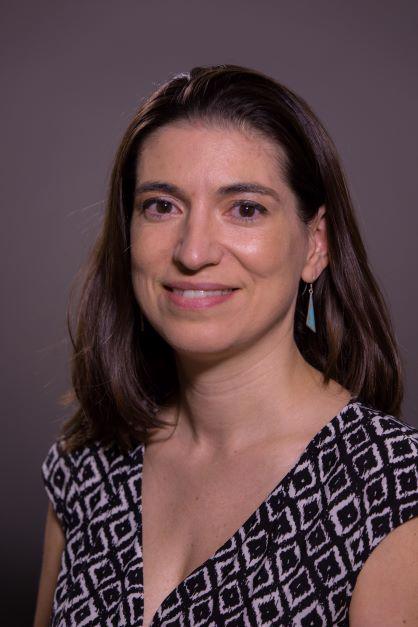



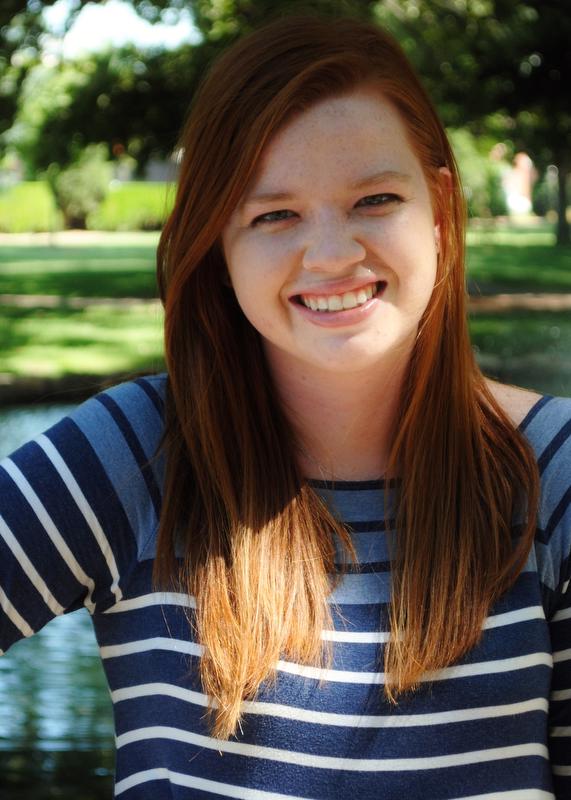

Kathryn Unruh, Ph.D.
KL2 Scholar

Rebecca Lepping, Ph.D.
KL2 Scholar

April McNeill-Johnson, M.D.
KL2 Scholar
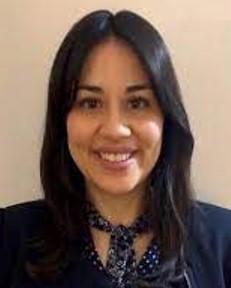
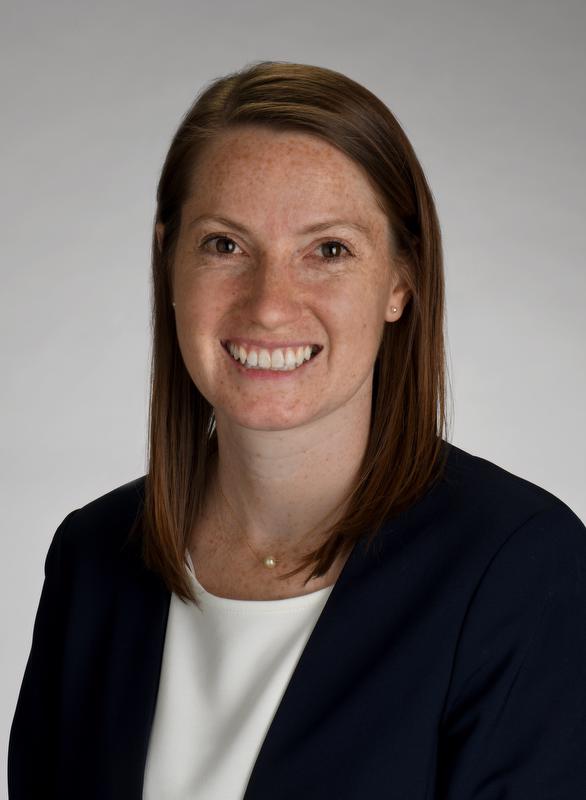
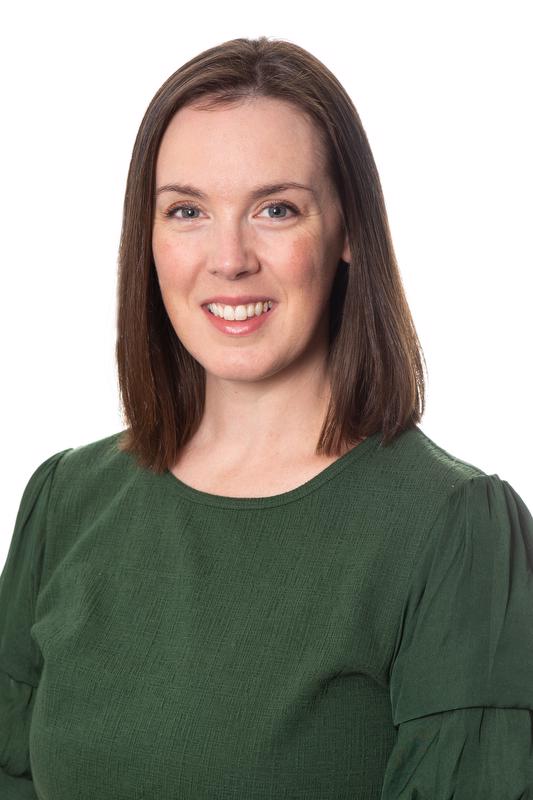
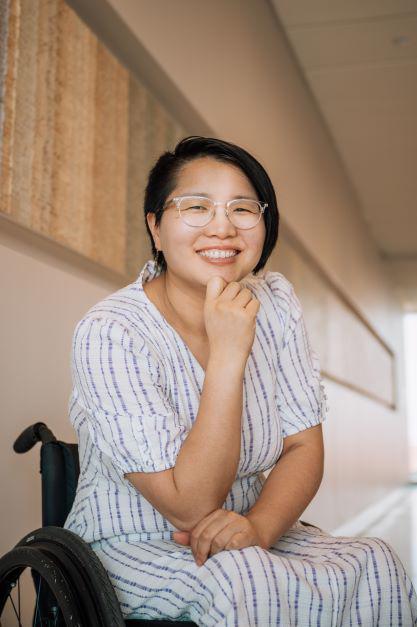
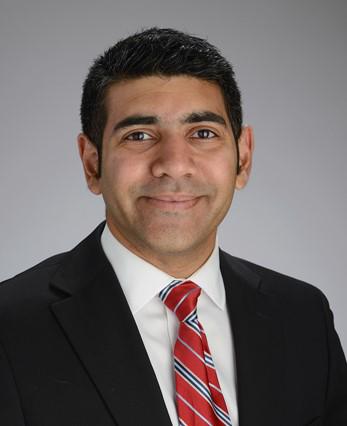
Abid Qureshi, M.D.
KL2 Scholar
Postdoctoral Career Development (TL1 Postdoctoral Program)
The Frontiers CTSI Postdoctoral TL1 Program is a prestigious training opportunity designed to cultivate a skilled cadre of postdoctoral translational researchers. Supported by the National Institutes of Health (NIH) Clinical and Translational Science Award, the TL1 Program provides trainees with the knowledge, skills, and resources necessary to drive innovative and impactful clinical and translational research. Through a combination of mentorship, education, and hands-on research experience, the program aims to foster a culture of excellence, collaboration, and innovation among its trainees, ultimately leading to improvements in health outcomes for individuals and communities.
The TL1 has three main components:
- Developing productive and beneficial mentoring relationships
- Completing the core curriculum
- Successfully conducting a translational research project
At the heart of the TL1 Program is a strong emphasis on mentorship. Trainees work with experienced mentors who provide guidance and support in scientific research, career development, and work-life integration. With access to a range of mentors and resources, trainees have the opportunity to develop into independent researchers capable of addressing complex health challenges. The program also offers a tailored core curriculum that includes training in clinical and translational research, as well as career development activities. By providing trainees with the necessary skills, knowledge, and support, the Frontiers CTSI TL1 Program aims to nurture the next generation of leaders in translational science.
Questions regarding the program can be sent to the KL2 & TL1 Program Director, Holly Zink, Ph.D., MSA.
Program Benefits
The TL1 Program offers a range of benefits designed to support trainees in their development as independent clinical and translational researchers:
Up to 2 Years of Training and Support: The Postdoctoral TL1 Program offers a comprehensive training experience spanning up to two years, providing scholars with ample time to immerse themselves in their research and professional development.
Competitive Stipend and Research Project Expenses: Scholars receive a stipend ranging from $56,484 to $68,604 (2023 NRSA Level)*, ensuring financial stability during their training. Additionally, a research project fund of $12,000 is provided to support their research endeavors.
Childcare support: The program provides childcare costs up to $2,500*, alleviating some of the financial burden for trainees with children and enabling them to focus on their research and training.
Intensive Mentored Research Experience: The program offers scholars the opportunity to engage in an intensive mentored research experience. They work closely with experienced mentors to develop their research skills and advance their projects.
Formal Training in Clinical and Translational Research: Scholars benefit from formal training in clinical and translational research, gaining valuable skills and knowledge that enhance their research capabilities.
Tuition Remission for MS-Clinical Research Coursework: The program offers tuition remission* for scholars pursuing coursework related to the Master of Science in Clinical Research, further enhancing their research training.
Additional Travel Support: Scholars receive additional travel support to attend the National Association for Clinical and Translational conference, providing opportunities for networking and professional development.

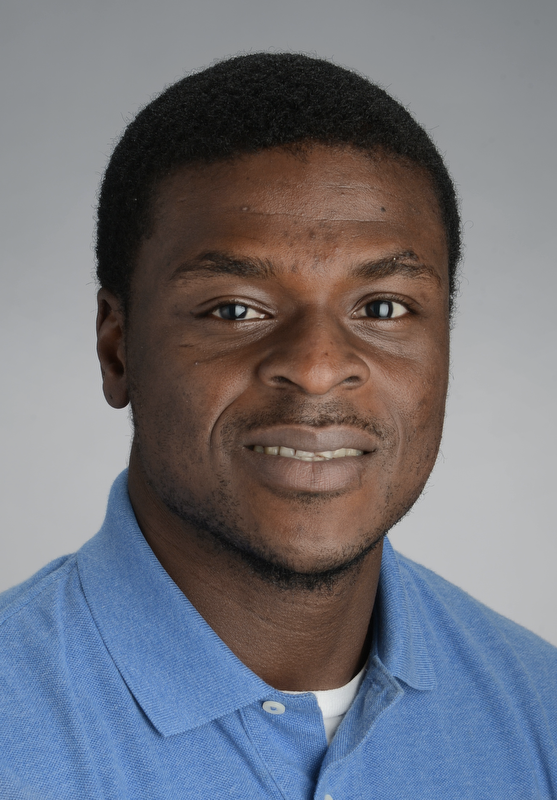
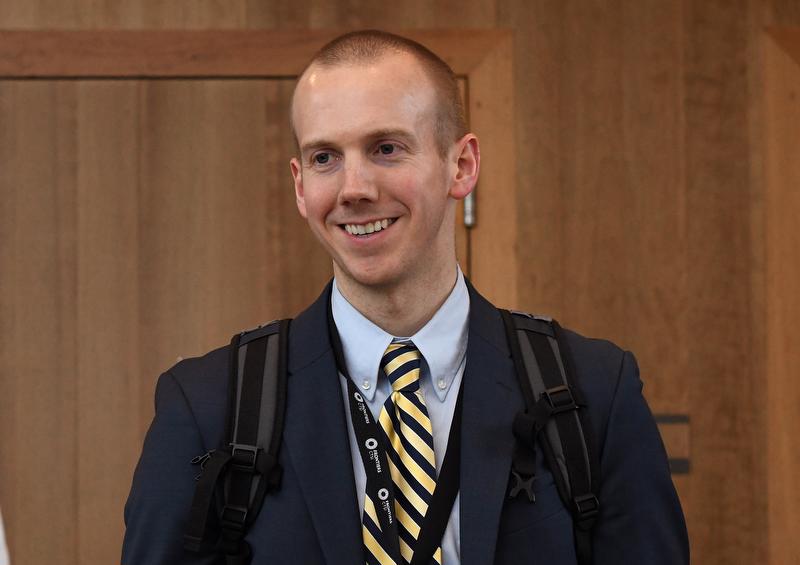
Brian Helsel, Ph.D.
Post Doctoral Fellow, Alzheimer's Disease Center
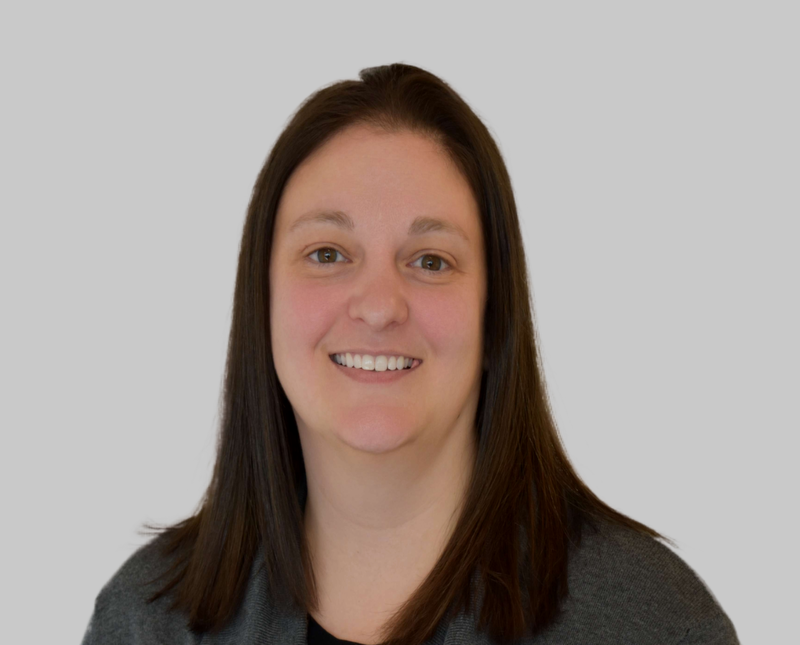
Stacey Aaron, Ph.D.
TL1 Post-doctoral Trainee
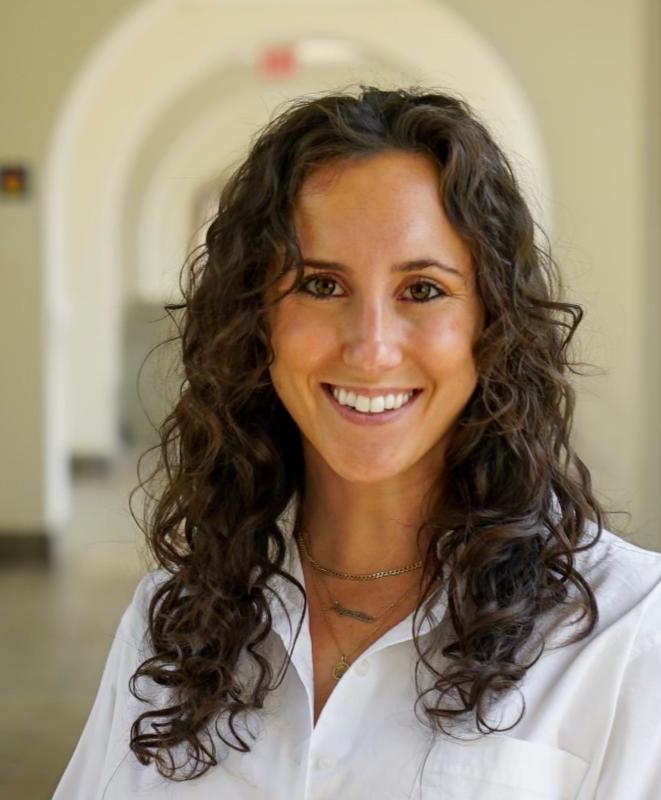
Sarah Weinsztok, Ph.D.
TL1 Postdoctoral Trainee

Landon Deru, Ph.D.
TL1 Postdoctoral Trainee
Predoctoral Career Development (TL1 Predoctoral Program)
Predoctoral Career Development (TL1 Predoctoral Program)
The Frontiers CTSI Predoctoral TL1 Program is a prestigious training opportunity designed to cultivate a skilled cadre of predoctoral translational researchers. Supported by the National Institutes of Health (NIH) Clinical and Translational Science Award, the TL1 Program provides trainees with the knowledge, skills, and resources necessary to drive innovative and impactful clinical and translational research. Through a combination of mentorship, education, and hands-on research experience, the program aims to foster a culture of excellence, collaboration, and innovation among its trainees, ultimately leading to improvements in health outcomes for individuals and communities.
The TL1 has three main components:
Developing productive and beneficial mentoring relationships
Completing the core curriculum
Successfully conducting a translational research project
At the heart of the TL1 Program is a strong emphasis on mentorship. Trainees work with experienced mentors who provide guidance and support in scientific research, career development, and work-life integration. With access to a range of mentors and resources, trainees have the opportunity to develop into independent researchers capable of addressing complex health challenges. The program also offers a tailored core curriculum that includes training in clinical and translational research, as well as career development activities. By providing trainees with the necessary skills, knowledge, and support, the Frontiers CTSI TL1 Program aims to nurture the next generation of leaders in translational science.
Questions regarding the program can be sent to the KL2 & TL1 Program Director, Holly Zink, Ph.D., MSA.
Benefits of the TL1 Predoctoral program:
- One year of training and support: Trainees receive comprehensive training and support for one year to enhance their research skills and prepare them for a career in clinical and translational research.
- Stipend and research project expenses: Trainees receive a stipend of $27,144 (2023 NRSA Level)* to support their living expenses during the program. Additionally, they receive $4,550 for research project expenses*, allowing them to conduct their research effectively.
- Childcare support: The program provides childcare costs up to $2,500*, alleviating some of the financial burden for trainees with children and enabling them to focus on their research and training.
- Intensive mentored research experience: Trainees benefit from intensive mentored research experiences, working closely with experienced researchers to develop their skills and knowledge in clinical and translational research.
- Master of Science in Clinical Research (MS-CR) degree: Trainees have the opportunity to earn a Master of Science in Clinical Research (MS-CR) degree with full tuition remission, enhancing their qualifications and career prospects.
- Travel support: Trainees receive travel support to attend the National Association for Clinical and Translational conference, providing them with networking and professional development opportunities in the field of clinical and translational research.
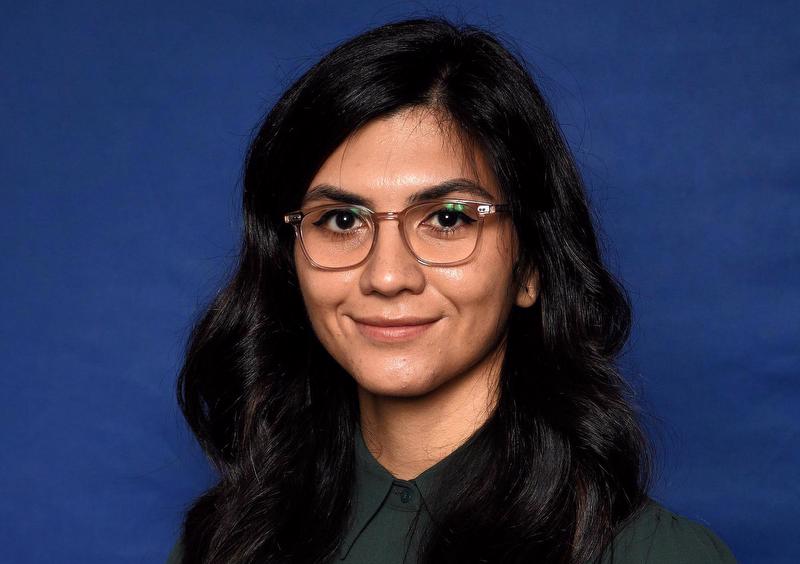
Bertha De Los Santos
KU Medical Center, PharmD student
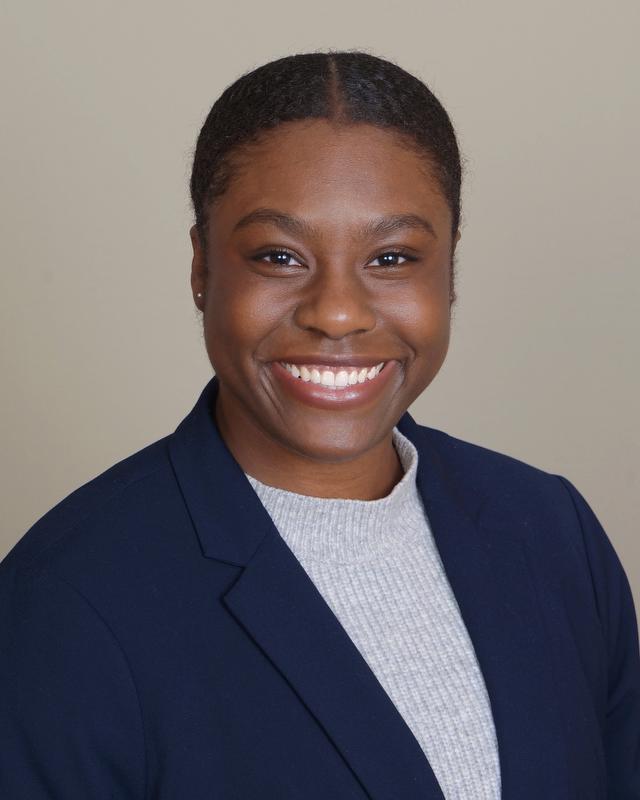
Jada Ohene-Agyei
TL1 Pre-doctoral Trainee
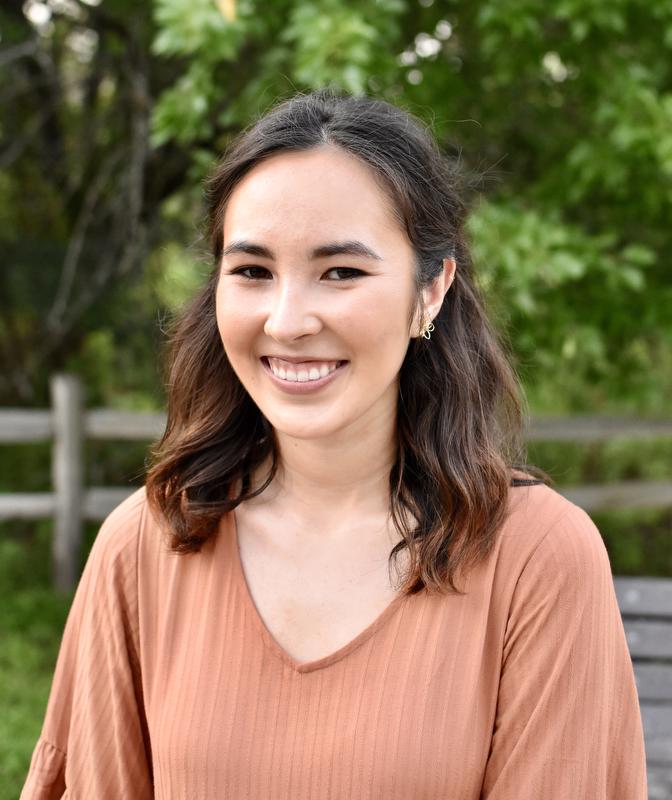
Sarah Johnson
TL1 Pre-doctoral Trainee

Dhanushki Abeykoon
TL1 Predoctoral Trainee

Rong Xin Liu
TL1 Predoctoral Trainee
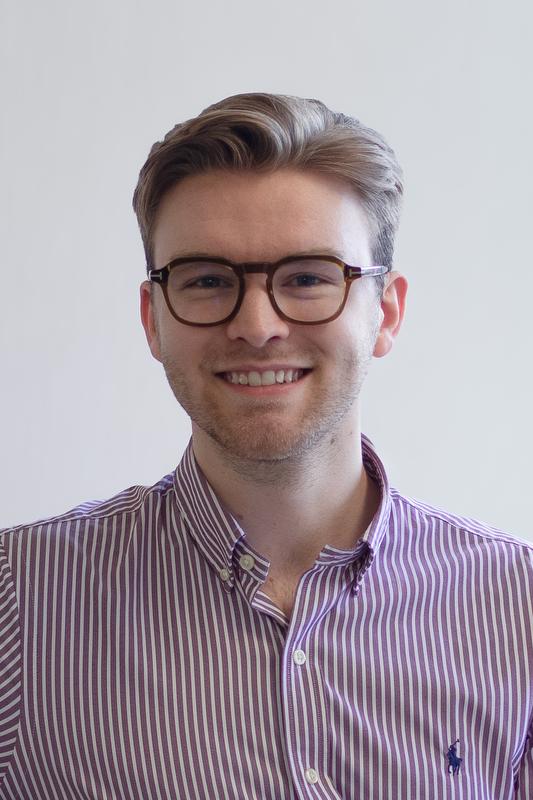
Cole Bird
TL1 Predoctoral Trainee

Trenton Edwards
TL1 Predoctoral Trainee
Frontiers Scholars Club
The Frontiers Scholars Club is a monthly forum where scholars have the opportunity to come together with experienced researchers to share work in progress, discuss career development, identify resources to support their research, troubleshoot mentorship issues, learn about new research strategies, and address work-life balance. All KL2 and TL1 trainees participate in the Frontiers Scholars Club along with other early-career clinical and translational researchers.
Contact Holly Zink, Ph.D., MSA, for more information.
Mock Study Section
Frontiers Clinical and Translational Science Institute (CTSI) will host Mock Study Sections semiannually to facilitate pre-submission review of National Institutes of Health (NIH) R, K, and F series grant applications. These sessions provide advance review of planned proposal submissions by Frontiers-affiliated clinical and translational science researchers. The purpose of this program is to increase the likelihood of NIH funding success by providing feedback to prospective applicants on grant proposals prior to submission. The Mock Study Sections (MSS) simulate an actual NIH study section, providing timely feedback to prospective applicants using the NIH's review criteria.
For questions about the program, please contact Heather Fielding-Gebhardt, Ph.D.
Mock Study Section is offered twice a year.
Complete Notice of Intent Survey.
Spring 2026 Dates:
March 2 - Notice of Intent Due
April1 - Full Application Due
May 4 - Mock Study Section
Fall 2026 Dates:
Oct. 2 - Notice of Intent Due
Nov. 2 - Full Application Due
Dec. 7 - Mock Study Section
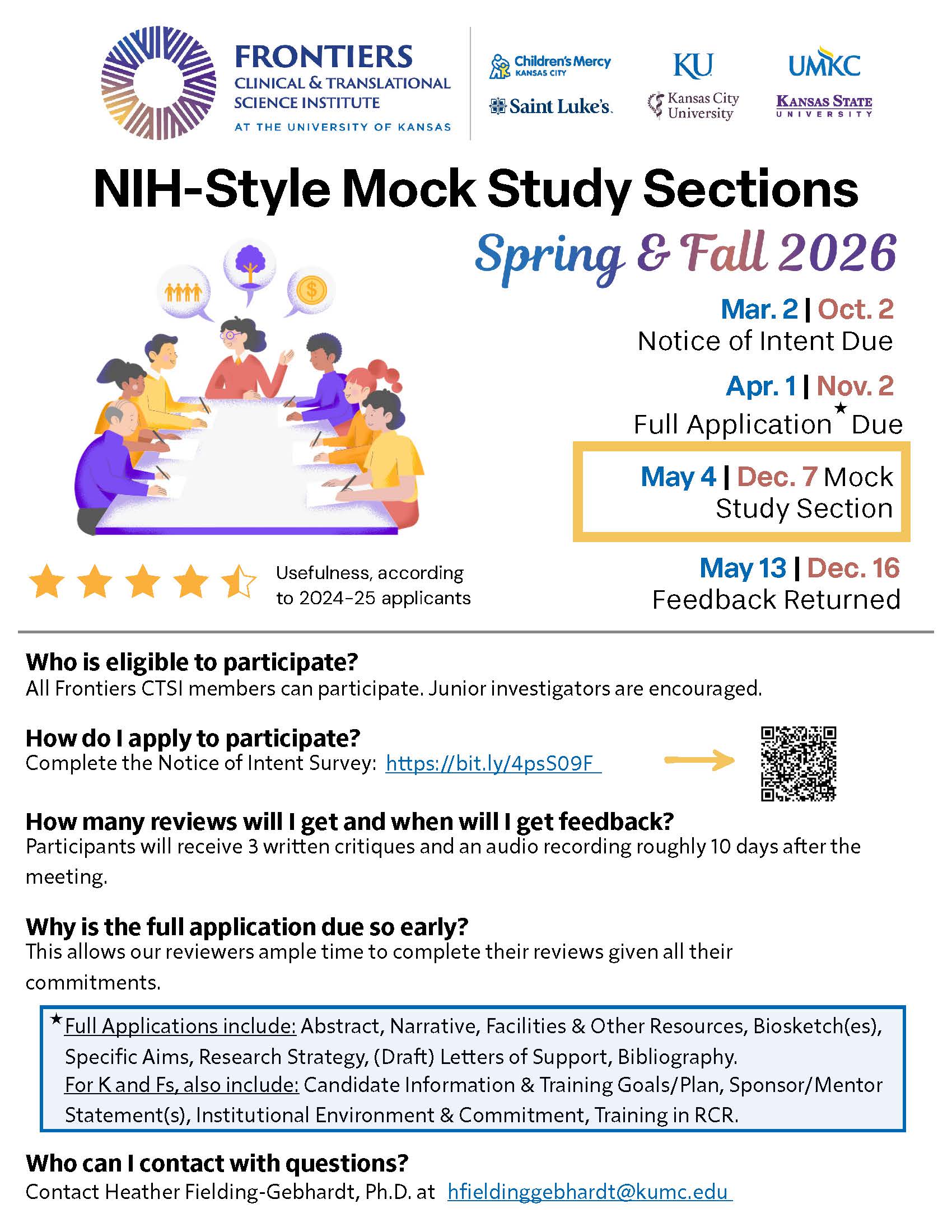
The MSS is available to clinical and translational researchers affiliated with any Frontiers institution. The service is open to all career stages whose work is defined by the NIH as Clinical and Translational Research (CTR). The NIH definition includes patient-oriented research, epidemiologic and behavioral studies, outcomes research, and health services research.
Researchers who are interested in pre-review of an NIH grant proposal through the MSS should complete the online Letter of Intent (LOI). Frontiers Central will review LOI submissions to confirm eligibility and applicability of the MSS review process. Once the LOI has been reviewed and eligibility has been confirmed, Frontiers will contact you to submit your proposal.
A completed draft of each applicant's NIH proposal must be submitted by the program cycle deadline. Early submission allows time for careful review by members of the Study Section. Applicants will receive a link to submit their completed draft proposal by the due date. Applicants are advised to register their interest in participating early. The Frontiers MSS is most beneficial when applications are complete and compliant with NIH grant submission guidelines. Required proposal documents vary by NIH funding mechanism but are limited to those key parts that are needed for an effective review. Currently, R, K, and F series grants are eligible for review through the mock study section.
Applicants are asked to recommend qualified reviewers during the registration process. Additional reviewers will be invited based on (1) their content area expertise and its relevance to the applications under review, and (2) their experience reviewing the specific NIH grant types submitted by applicants. Final selection of reviewers for a specific MSS event is determined by the content of proposals submitted by applicants.
Submitted applications will be available to reviewers at least four weeks prior to the MSS meeting. Reviewers will be asked to submit preliminary scores and written critiques prior to the meeting using an online platform.
Interested in being a reviewer? Fill out our form.
Applicants and observers will be invited to remotely join the MSS meeting, which simulates an actual NIH study section. Applications will be discussed and final scores assigned during this meeting. Scores and written feedback are returned to applicants approximately 1-2 weeks after the MSS meeting.
The MSS mirrors the NIH review process. Three expert reviewers provide initial scores prior to the discussion. At the MSS, co-chairs facilitate the panel review. Three reviewers discuss feedback on individual grant applications, and final scores are given after the discussion is complete. The study section uses NIH scoring criteria and procedures. The entire review panel scores each application. Comments are compiled into a Summary Statement and released to applicants 1-2 weeks following the mock study section.
The MSS provides grant-writers with a better understanding of NIH review procedures and timely feedback on in-progress proposals to improve the quality of grant submissions.
Observers are invited to attend the MSS to better understand the NIH review process and the criteria used to evaluate applications.
Clinical Research Professionals (Training and Certification)
Society of Clinical Research Associates (SOCRA)
SOCRA is one of the leading professional organizations for clinical research professionals and offers the Certified Clinical Research Professional (CCRP) credentialing program along with continuing education. Greater Kansas City is home to a SOCRA chapter which facilitates networking and learning for the region.
Association of Clinical Research Professionals (ACRP)
ACRP suppors clinical research professionals through membership, training and development and certifications. Greater Kansas City is home to an ACRP chapter which serves Kansas City and the surrounding area with training and community.
Clinical Trials Management (undergraduate minor)
The Bachelors degree in Health Sciences on the KU Edwards campus also offers a minor in Clinical Trials Management.
Mentorship
Mentoring is essential to the Frontiers Programs, shaping our scholars' development and success. Our multifaceted approach includes scientific guidance, career navigation, and personal support, emphasizing interdisciplinary collaboration and community engagement. Scholars also receive training from the Center for the Improvement of Mentored Experiences in Research (CIMER). CIMER-trained faculty and staff provide research mentor and mentee training, equipping scholars with the skills to foster effective mentoring relationships, promote cultural change, and build a strong network of mentors and mentees. This training enhances the mentorship experience in the research enterprise.
For mentorship questions, contact KL2 & TL1 Program Director, Holly Zink, Ph.D., MSA.
This 5-session series brings trainees and mentors with lived-experienced together to discuss the creation of environments conducive to recruitment and retention, the importance of both mentorship and sponsorship, and strategies for building and empowering research teams. Thanks to our colleagues in the Sunflower Pediatric Clinical Trials Network for sponsoring this program.
This easy to navigate website provides brief step-by-step guidance for both mentors and mentees as the embark on and cultivate a mentoring relationship.
Courses and Mini-Courses
Frontiers institutions offer a variety of graduate certificate and degree programs designed to help graduate students and clinician scientists develop critical skills related to translational research, including programs in clinical research, informatics and biostatistics.
This 3-credit hour course combines instruction and practical exercises to move the participant step-by-step through all stages of planning research, identifying funding sources, and writing grant applications primarily to the National Instiutes of Health (NIH). Upon completion of the course, the student will have developed a quality proposal and be able to demonstrate skills in preparing apllications. These will include developing fundable research ideas, identifying appropriate funding opportunities, developing application sections, and crafting a quality grant application. Peer-review and collaborative feedback to other class participants is a major part of the learning experience. Contact the Frontiers Training Navigator for more information.
This 2-credit hour course addresses the mechanics of how to write clearly, focusing on mechanics, structure and style. Students will practice specific strategies for writing effectively, with in-depth attention paid to how ideas are distributed through well written sentences and paragraphs. The course also includes editing and revision of writing for publication and grant submission. Contact the Frontiers Training Navigator for more information.
This 3-credit hour course covers the methods of comprehensive syntheses of research evidence. Rigorous review methods will be highlighted, such as searching for potentially relevant articles; selecting primary articles using explicit, reproducible criteria; appraisal of studies; quantitative data syntheses; and, interpretation. The course uses the framework provided by the GRADE Working Group to evaluate certainty of estimates and present and interpret evidence. The focus of the course is on systematic reviews of interventions, which typically include randomized trials and non-randomized studies that evaluate therapeutic interventions and outcomes. The process can be applied to other review topics and study designs, which may be mentioned but not covered in the course. Contact the Frontiers Training Navigator for more information.
This course covers the design, implementation, analysis, and assessment of controlled clinical trials. Basic biostatistical concepts and models will be emphasized. Issues of current concern to trialists will be explored. Contact the Frontiers Training Navigator for more information.
The purpose of this 1-credit hour course is to engage research trainees in reading about, considering, and discussing the responsible conduct of science. The course is designed as an option for meeting current federal regulations, which require that all NIH training grants provide training in responsible conduct of research. This course provides a concise overview of key subject areas in the responsible conduct of research. It is designed to make students aware of relevant guidelines, policies and codes relating to ethical research, as well as to provide the skills for identifying and resolving ethical conflicts that may arise in research. Contact the Frontiers Training Navigator for more information.
This course introduces the principles and practices required to conduct rigorous and reproducible research across the translational spectrum. The National Institutes of Health (NIH) promotes rigor and reproducibility in their guidance to grant applicants as part of the scorable parameters that grant reviewers must address. In this course, students learn best practicies, including sound study planning and design, consideration of all relevant biomedical variables, sound data management practices, statistical considerations and techniques, and transparency in reporting research results. Contact the Frontiers Training Navigator for more information.
Implementation Science Course. This 3-credit hour introductory course addresses theoretical principles and practical applications of implementation science. Contact the Frontiers Training Navigator for more information
Training in Implementation: Actionable Research Approaches (TIARA). The 4-module, self-guided training program integrates key readings and recorded presentations to guide both researchers and clinicians interested in orgainzational imporvement through theories and pragmatic approaches to translating evidence into practice. Module 1 addresses basic definitions and principles in implementation science, Module 2 addresses theory and approaches, Module 3 covers design and analysis, and Module 4 addresses practice-based considerations.
NIH Implementiation Science Webinar Series. These Implementation Science Webinars bring together national leaders in the field to discuss advanced dissemination and implementation research topics and answer questions from the community. You can register for upcoming webinars and view archived sessions covering Implementation Science topics.
Implementation Science Core Resources. Additional information on implementation science training opportunities and individual consulations can be seen here.
This brief, 4-part introduction to Biostatistics for Clinical and Translational Researchers is offered live each summer and is a great orientation to study design and statistics for students and clinicians that are new to research.
Recordings of presentations from prior years are also available.
Small group sessions are offered each week to provide training for Frontiers investigators and KU Medical Center affiliates for our supported informatics systems REDCap (data capture) and HERON (cohort discovery and data extraction).
The Master of Science in Clinical Research (MS-CR) degree at the University of Kansas is a 33-credit hour program designed to help aspiring researchers and clinician scientists develop critical research-related skills in epidemiology, biostatistics, data management, research methods, scientific writing and research ethics. Students are encouraged to develop a publishable manuscript as part of their culminating thesis.
The Master of Science in Bioinformatics at the University of Missouri-Kansas City is designed to support students interested in a career in bioinformatics, clinical research, or both. The program provides strong foundational training in clinical research skills with an emphasis on patient-oriented research and medical informatics.
The Certificate in Clinical Research at the University of Missouri-Kansas City is a 15 credit hour program that provides foundational training in clinical research and is designed to support students who either do not need or are presently unable to meet the requirements of a full master degree program.
The Health Data Science Graduate Certificate program includes 15 credit hours of coursework from the KUMC Health Data Science curriculum. This program offers students the flexibility to complete it online, in-person, or through a hybrid model. It is designed to supplement the education and careers of individuals who work in various fields such as health care, insurance, consulting, education, health anayltics, biomedical research, government and biology.
Education and Training Team
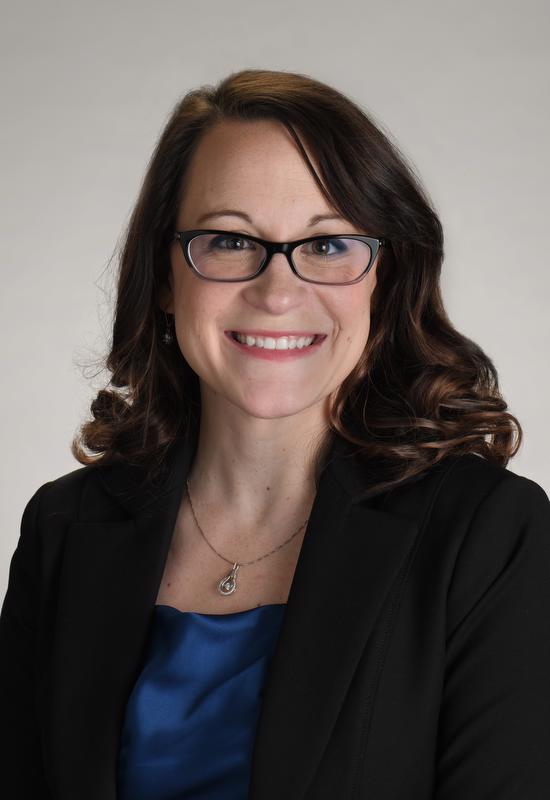

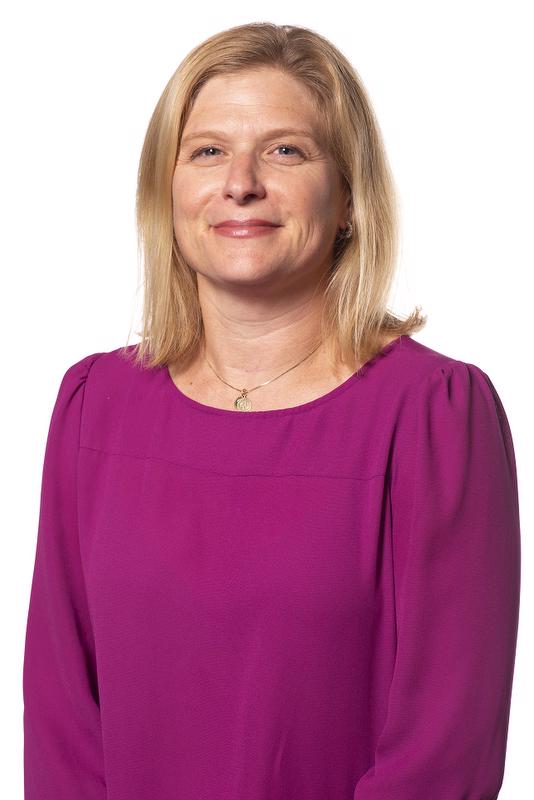

Nicole Nollen, B.S, M.A., Ph.D.
Professor, Population Health; Co-leader of Cancer Prevention and Control program at KU Cancer Center; Early Career Faculty Training Program (KL2) Co-PI
Link to Biography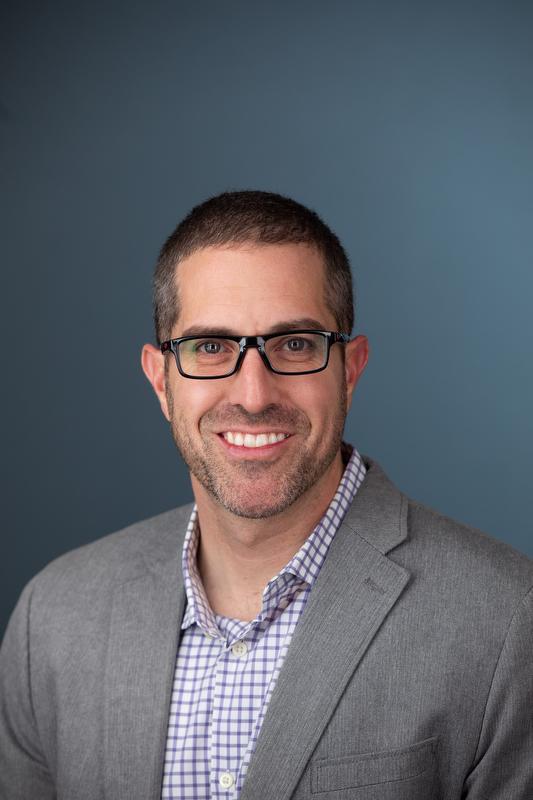
Matthew Mosconi, Ph.D.
Director, Kansas Center for Autism Research and Training; KL2 Co-PI
Link to Biography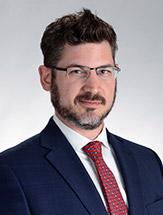
Jacob Sosnoff, Ph.D.
KUMC School of Health Profession Associate Dean for Research; Training Core (TL1) Co-PI
Link to BiographyResearch and Discovery Grand Rounds
Presentations
Past Research and Discovery Grand Rounds Sessions
The Research & Discovery Grand Rounds series is a monthly presentation highlighting information, resources and advancements in clinical and translational research. Our events calendar has dates of upcoming events and the opportunity to register.
Sessions are typically presented via Zoom on the fourth Thursday of each month from 12:00-1:00PM CT, unless otherwise noted. Visit the event calendar for upcoming sessions and view recordings of past sessions via Frontiers YouTube channel.

